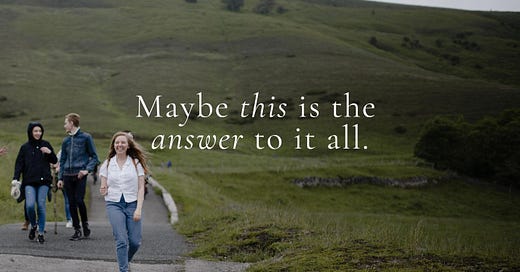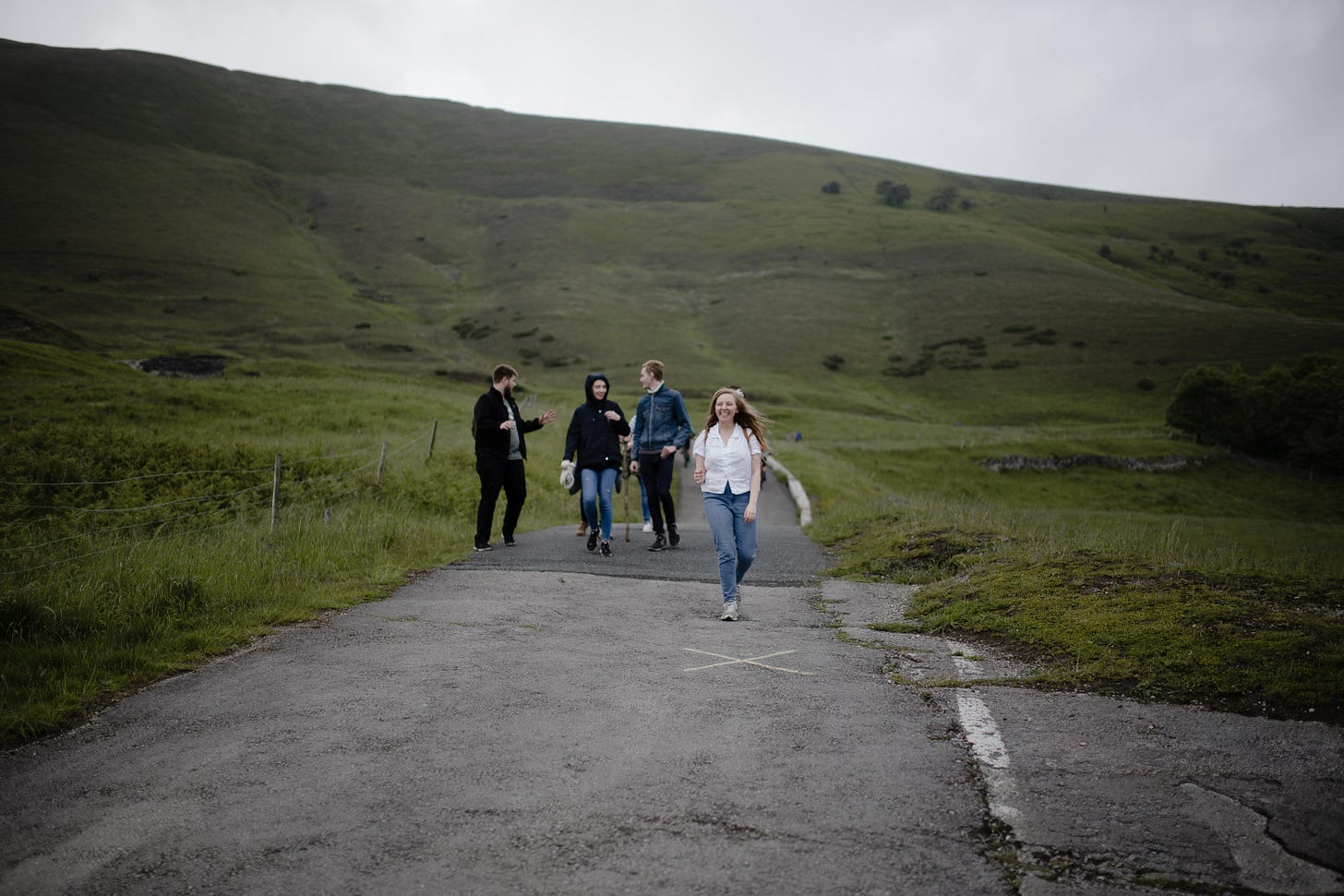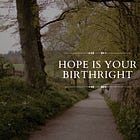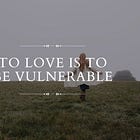Maybe this is the answer to it all.
My choices are fear, grief, or apathy – I choose the fourth option.
This is NOT another election post (I worked overtime to release 4 podcast episodes on that topic, and I’m burned out). No, this idea has been sitting in my notes app for months. It’s 5:30am (my dog’s bladder woke me up), and for whatever reason, now is the time.
Yesterday, I was having a conversation with a dear friend about some tough stuff that she’s going through (vagueness intended – it’s none of my business to share), and what struck me is that as I waffled on about some comforting theology to remind her of God’s love for her, the God of the Old Testament was the solid ground on which I stood.
Once upon a time, I found myself in an anti-intellectual flavour of evangelicalism. You know the kind: the one that LOVES the God of the New Testament but finds the OT God a little “much.” (Cognitive dissonance, is that you?!)1
Never mind that both Gods are one in the same2 – that’s a revelation only the Spirit can bring each of us as we dare to open our Bibles and flip to the pages before Matthew. What I can say is that the more I study the Old Testament, the more I like the God I find there.
This God who sacrificed His Son in the NT feels so flippin relatable in the OT. When His people sin against each other, He’s angry. When He witnesses injustice, He grieves. When they walk away from Him, He laments. In essence, He feels a lot of the things that I feel.
But let’s not be deceived. He’s still the Almighty. His ways are not my ways. His thoughts are not my thoughts.
And (‘scuse the pun) thank God! Because in His elevation, I can rest in Heavenly wisdom that eludes my finite brain. Wisdom that is handed to me on a silver platter in the form of the prophets.
What I mean is this: our current slice of time in history is not as unique as we’d like to think. We are not under threats which have not previously been known to humanity. I’m in no way attempting to downplay what’s going on in the world right now, nor do I dismiss my privilege in saying this from the comfort of my home in England (though I have not always been so comfortable).
But think about it: the pandemic (and all the political and public health turmoil that came with it) wasn’t that long ago. 9/11 wasn’t that long ago. The World Wars weren’t that long ago. (And those are just touch points, primarily, of Western history).
We like to tell ourselves that the world has never known such a scary time as this, but it simply isn’t true.
And I’d like to be so bold as to say that our Old Testament illiteracy is enabling our anxiety to fester and grow – because the less we know about our own human story, the less we know about God’s kindness to us in terrifying times.
Everyone loves to quote Jeremiah 29:11, but if you read the rest of the chapter, there’s far richer encouragement than simply “I know the plans I have for you.” (No shade for loving that verse though, by the way – I had it written across my high school graduation cap in pink glitter before I’d read the rest of the chapter, too).
The beginning of the chapter sets the scene: God’s people have been taken into exile in a country that was not… shall we say… very accepting of their way of life:
This is the text of the letter that the prophet Jeremiah sent from Jerusalem to the surviving elders among the exiles and to the priests, the prophets and all the other people Nebuchadnezzar had carried into exile from Jerusalem to Babylon.
Jeremiah 29:1
In case you’re wondering, that Nebuchadnezzar is the same one from the book of Daniel – you know, the Babylonian king who threw three Jews into a furnace when they wouldn’t worship the gold statue he’d made.
So to recap, God’s people were living in a pagan nation, with religious practices that were drastically in conflict with God’s law (this is Babylon we’re talking about), and they were under a king who had no problem chucking them into a fire for not worshipping his favourite trinket.
Needless to say, if they wanted valid reasons for having anxiety, they didn’t need to look far. And yet, when you carry on reading the chapter, God, through the prophet Jeremiah, says this:
This is what the Lord Almighty, the God of Israel, says to all those I carried into exile from Jerusalem to Babylon: “Build houses and settle down; plant gardens and eat what they produce. Marry and have sons and daughters; find wives for your sons and give your daughters in marriage, so that they too may have sons and daughters. Increase in number there; do not decrease. Also, seek the peace and prosperity of the city to which I have carried you into exile. Pray to the Lord for it, because if it prospers, you too will prosper.” Yes, this is what the Lord Almighty, the God of Israel, says: “Do not let the prophets and diviners among you deceive you. Do not listen to the dreams you encourage them to have. They are prophesying lies to you in my name. I have not sent them,” declares the Lord.
Jeremiah 29:4-9
In the midst of such religious and cultural oppression, exile, and violence, God’s people could have easily remained frozen in fear and anxiety or shut down in apathy. But God gave them a fourth option: live simple, quiet, beautiful lives. Build homes for yourself. Plant things and watch them grow.3 Eat good food. Find pleasure from the work of your hands. Find spouses and enjoy sex. Grow your families and be in community with one another. Let beauty eke out of the way you live. Pray for your city and seek its peace because you too will experience peace. And do not listen to lies.
My generation of millennials is rebelling against the workaholic culture which told us that we could be anything we wanted to be if we only worked hard enough. Instead, we’re seeing a mass exodus of people from corporate routines who are retreating into this idea of simple living because the notion of rest and balance is more alluring than the sexiness of status and prestige.
Amidst a world of raging media noise, gardening, houseplants, and sourdough starters are taking the world by storm, even (maybe especially?) amongst our secular culture.
Is it possible that our souls are finding their way back home?
Could it be that maybe, just maybe, we were designed to live simply, work with our hands, and enjoy the fruits of our labour? Is it possible that our resistance to this simplicity in exchange for “impact” is why we’re also finding ourselves in a mental health crisis, believing the lie that this time in history warrants our anxiety more than any other?
Of course, for Christ followers, this life of simplicity goes one step further. We are called to holiness, as Paul reminds the church of Thessalonica. But he too, after giving instruction for purity and righteousness, finishes with this often overlooked note:
… make it your ambition to lead a quiet life: You should mind your own business and work with your hands, just as we told you, so that your daily life may win the respect of outsiders and so that you will not be dependent on anybody.
1 Thessalonians 4:11
I’m not naive, friends: I know we can’t all quit our jobs tomorrow and start our own version of Clarkson’s Farm.
All I’m saying is this: what if it was never our job to change the world? What if leading quiet lives, finding joy in the work of our hands, enjoying time with our loved ones, and praying for all really is enough?
Should we still care about what’s going on in the world and take action where we can to bring Heaven to Earth? Of course. Simplicity ≠ apathy. But I’m so inspired by the constant reminder from Sharon McMahon: the biggest changes often come from the small, humble acts of ordinary people.
When my grandfather was dying of cancer, I flew back to the U.S. just before Christmas to support my mom. The first morning that I got to the hospital, I noticed that the curtains were drawn (not by my grandpa’s request), and the entire room was dark and musty and empty. I wasn’t a doctor. I couldn’t do the “big stuff.” But I could open the curtains and let light in. I could turn on worship music. I could pray for him. I could bring a tiny Christmas tree to his room and decorate it while he watched. Did it heal my grandpa’s cancer? No. But it brought simple beauty and joy to the atmosphere as he enjoyed some of his last days.
The final piece of God’s word for his people in this section of Jeremiah 29 is this: discern His voice from the lies. Since the introduction of social media and smartphones, even I will concede that we are in a unique time in history when it comes to being deceived. Is it possible that our mental health is on a global decline because our brains were never designed to take in this much harmful information at the price of forfeiting our ability to be present and active in our own lives? Is it possible that amidst all the noise, we don’t even know how to hear God’s voice anymore?
If so, never has reading my Bible felt more important.
Do not let the prophets and diviners among you deceive you. Do not listen to the dreams you encourage them to have. They are prophesying lies to you in my name. I have not sent them.
Wherever you might find yourself absorbing a message (even a message you might want to hear, like the Israelites did) that fills you with anxiety, fear, hopelessness, apathy, or simply a false sense of this world, I urge you to remember God’s words: I have not sent them.
What He has sent is His Word; and man, let me tell you, it’s not as irrelevant and musty as some might have you believe. Especially when it comes to refreshing invitations like these:
Put down your phone.
Shut the telly off.
Turn some music on.
Cook a beautiful meal.
Text your friend and just say “I love you.”
Pray for your mayor.
Pray for your local hospital.
Bake some cookies.
Play with your kids.
Take a walk.
Put some art on your walls.
Dance in your kitchen.
Have some steamy, delicious sex with your spouse; or if you’re single (because I can’t stand how singles are missed out from the Church’s message), reach out to your best friend and go out together to eat the most indulgent French bread and camembert cheese you can find (I’m only half kidding when I say cheese is the next best thing to sex).
C.S. Lewis put it another way:
If we are all going to be destroyed by an atomic bomb, let that bomb when it comes find us doing sensible and human things—praying, working, teaching, reading, listening to music, bathing the children, playing tennis, chatting to our friends over a pint and a game of darts—not huddled together like frightened sheep and thinking about bombs. They may break our bodies (a microbe can do that) but they need not dominate our minds.
What I mean is create homes, plant gardens (as in, cultivate beauty with your own two hands), enjoy the fruits of your labour, eat good food, enjoy the love of good people, live the simple, sweet pleasures of being alive. Because maybe, just maybe, this is the answer to it all. Maybe God created life to be enjoyed, and in spite of the darkness falling around us on all sides, He’s still calling us back to bask in His simple yet glorious light.
All my love,
P.S. Just a reminder that clicking the little “heart” or even the “restack” button on my work does SO much to get it out there to others (and I do a little happy dance every time). If this piece blessed you, please considering clicking a button that might share it with others.
Thoughts from this week:
Other essays you might fancy:
Get more out of The Battle Cry
The Battle Cry is an outpouring of work written for weary Christians who aren’t ready to give up on Jesus. All of my work comes from the overflow of a heart which believes that creativity, lament, and joy all sing the same song. To get more out of your subscription, consider becoming a paid subscriber, where you’ll get access to the following:
My private podcast, The Waffler.
A regularly updated list of exclusive Spotify playlists for writers, creators, and dreamy folk.
The option to enter a monthly prize draw to receive a free, 90-minute writing audit/mentorship call with me.
The option to enter a prize draw to receive 50% off of my writing course, Pick Up Your Sword, which launches in January.
Access to my devotional, Inspired by Joy, which, come December 1st, will be available to purchase for £10 unless you’re a paying subscriber of The Battle Cry (at the moment, you can still grab it by joining the waitlist for my writing course here).
Occasional bonus posts and essays with specific practical and creative writing tips.
Quarterly desktop and mobile wallpapers with quotes from Scripture & C.S. Lewis.
Just to clarify, I am not casting judgment on those who truly find the Old Testament overwhelming. It IS overwhelming at times. In fact, I’m not casting judgement at all (I have no right to do that). What I am is frustrated, not with any particular person but with the church cultures that support a fear, almost an aversion, to reading any part of the Bible that makes us uncomfortable.
Katie Donohue Tona, interestingly enough, wrote a profound post about this recently.
Breanne Rodgers wrote a beautiful post on this yesterday.










Oh my gosh this is so beautiful, Christina. I needed this reminder. 😭
I love that you posted that Jeremiah verse after I had been meditating on it in prayer. I had looked up the Bible lexicon meanings of each Word (which is fascinating) and had been meditating on when this Promise was given, and the horror the Israelites were about to face. Did you know that the Word future can also mean "survivors" and "descendants"? I love thinking of the descendants in Jesus' day, receiving the fullness of that Promise 💖
Like you, I love the Old Testament and my eyes are opening to see more and more of Jesus in it, as I take steps into the Catholic Church and faith, also. Oh the riches that are ours in Christ Jesus, who loves to give us more and more of Himself.